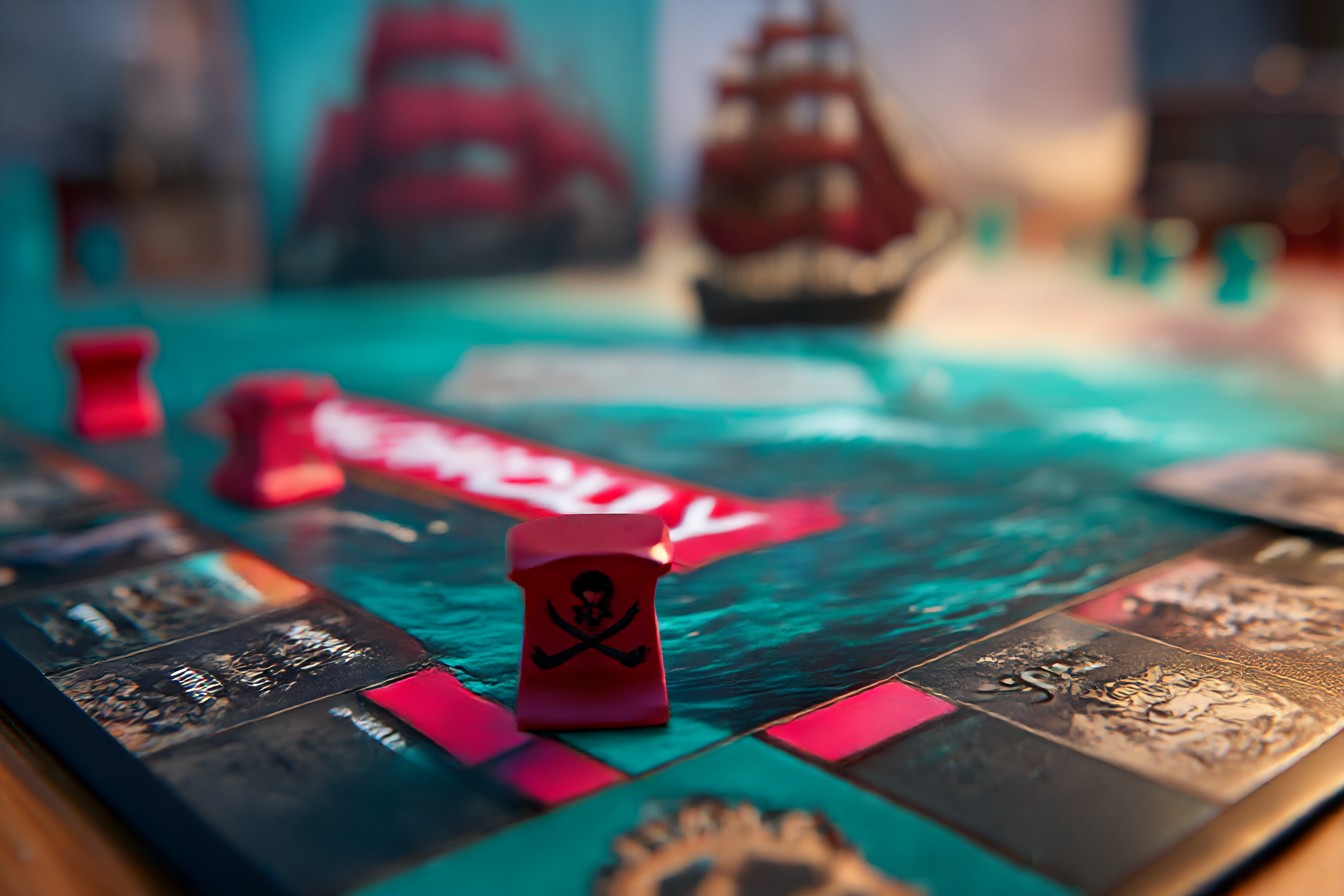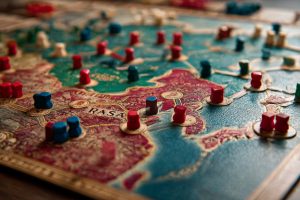So here’s the thing – I’ve been collecting board games for fifteen years now, and I thought I had Monopoly figured out completely. Buy properties, build monopolies, collect rent until everyone else goes bankrupt. Simple enough, right? Then my buddy Dave brings over this Sea of Thieves edition he picked up at Target, and I’m thinking great, another themed Monopoly that’s basically the same game with pirates slapped on top. Man, was I completely wrong about that.
First game we played, I went in with my usual Monopoly strategy. You know, trying to grab those orange and red properties, building up cash flow, the whole traditional approach. Meanwhile Dave and his son are doing all this voyage stuff and collecting doubloons, and I’m sitting there wondering what the heck is going on. By the time I figured out this wasn’t regular Monopoly with a pirate costume, they’d already sailed past me. Literally and figuratively.
The voyage system changes everything. Instead of just rolling dice and hoping you don’t land on Boardwalk with three houses, you’re actually choosing your own adventure. Pick a voyage card, follow the instructions, collect your rewards or face the consequences. It’s like someone took the basic Monopoly framework and turned it into something that actually requires decision-making beyond “should I buy this property or not?”
I’ve played this thing probably forty times now – yeah, I know, I have a problem – and I’m still finding new strategies. The early game is all about figuring out what kind of pirate you want to be. Are you going aggressive, stealing from other players? Playing it safe with merchant runs? Going for the big treasure hunts? I’ve tried all of them, and honestly, the best approach depends entirely on what everyone else is doing.
Here’s what took me way too long to figure out: timing is everything with the combat stuff. I spent my first few games either being too aggressive too early, making myself a target, or being too passive and missing opportunities. The sweet spot is building up quietly while other players are fighting each other, then striking when they’re weakened. It’s like poker in a weird way – you need to read the table and know when to make your move.
The doubloon economy is brilliant, actually. Regular Monopoly money is pretty predictable – you pass Go, you collect rent, you pay expenses. But doubloons come from everywhere. Completing voyages, winning battles, finding treasure, making deals with other players. And you can spend them on ship upgrades, hiring crew, buying information. It gives you way more interesting choices than just “buy property, pay rent.”
I learned the hard way that those merchant ship upgrades everyone ignores are actually incredible. While other players are fighting over treasure maps and trying to steal from each other, I started quietly upgrading my merchant capabilities. Boring, right? Except by the endgame I’m generating twice as much income per turn as the flashy pirates. Linda watched one of these games and said it reminded her of how I approach insurance sales – steady, consistent progress beats dramatic gestures most of the time.
The combat system isn’t just about having the biggest ship either, which surprised me. I’ve won battles with smaller vessels by understanding the dice probabilities better. Most players don’t bother learning the odds, they just roll and hope. But when you know you have a 60% chance of winning versus a 30% chance, you make different decisions about when to fight and when to run.
One thing I really appreciate is the alliance mechanics. You can team up with another player for a specific voyage, split the rewards, then go back to being competitors. It reminds me of those negotiation-heavy games where the real skill is in structuring deals that benefit you more than the other person realizes. I’ve made some partnerships that looked fair on the surface but were actually pretty heavily tilted in my favor.
Resource management becomes huge in the mid-game. I have this personal rule now – never let your doubloons drop below fifty unless you’re making a final winning push. Too many times I’ve seen players spend everything immediately, then get caught unable to afford something important. Or worse, they can’t take advantage of a great opportunity because they’re broke.
The late game is where this really shines though. Unlike regular Monopoly where it’s usually obvious who’s winning, this version keeps you guessing. That player in last place might be one voyage away from victory if they’ve been quietly working toward a specific goal. I’ve pulled off a few surprise wins this way, and I’ve been shocked by them too.
Weather events and the special cards add just enough randomness to keep things interesting without making it pure luck. The key is adapting when these disruptions happen instead of sticking stubbornly to your original plan. I remember one game where a storm card completely changed the board state, scattered everyone’s ships, and the player who adjusted fastest ended up winning.
What really gets me is how different the game feels with different player counts. Three players is almost a completely different game than six players. Smaller groups reward steady building and careful planning. Larger groups often require bold, risky moves because you need to stand out from the crowd. I’ve had to develop separate strategies for different group sizes.
The negotiation aspect is way more aggressive than other games in my collection. The pirate theme gives everyone permission to be a little more cutthroat in their dealing. People expect some backstabbing and betrayal, which makes for more interesting social dynamics if you lean into the role-playing aspect.
After all these plays, I still discover new strategic interactions. Just last week I realized you can use the information tokens in combination with certain voyage cards to set up moves three turns in advance. The replay value is genuinely impressive – each game develops its own story based on player choices and random events.
I’ve played this more than any other Monopoly variant in my collection, and that’s saying something because I own probably eight different versions. It’s one of those rare themed games that actually improves on the original formula instead of just changing the artwork. If you’re looking for something that feels familiar but requires completely different thinking, this pirate adventure delivers exactly that experience. Just don’t go in expecting regular Monopoly with a fancy coat of paint – you’ll get destroyed like I did that first game.
Lawrence’s Phoenix home is half game shelf, half museum. He’s played hundreds of titles and still gets excited about every new box. His posts focus on accessibility, replayability, and helping regular folks find the right game for their table.


Leave a Reply